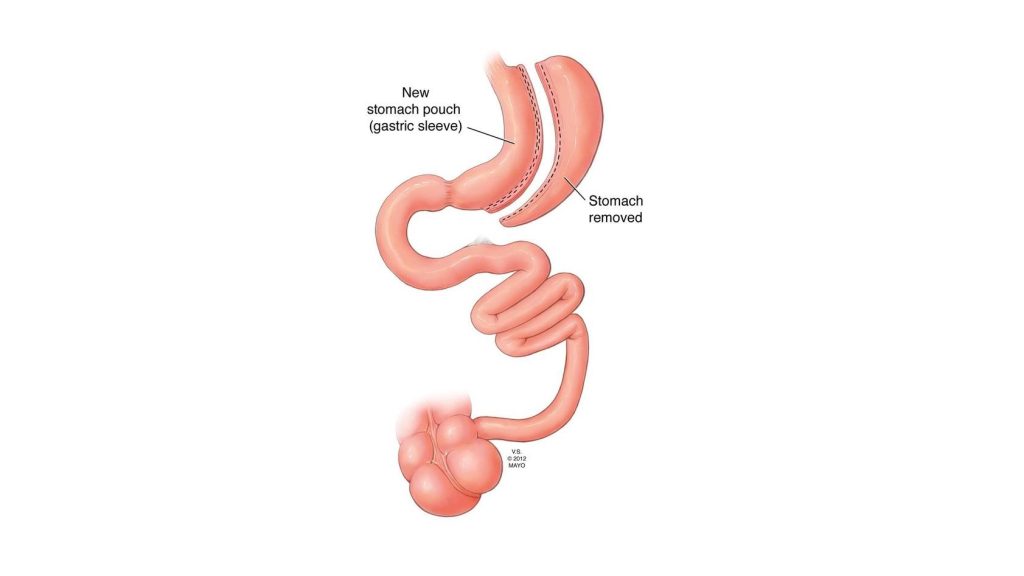-
Weight-loss surgery before kidney transplantation improves health and eligibility of patients with obesity and renal failure, Mayo Clinic study finds

ROCHESTER, Minn. — Laparoscopic sleeve gastrectomy promotes relatively rapid weight loss, reduces obesity-related health issues and improves eligibility for kidney transplantation for patients with advanced chronic kidney disease and obesity, according to new research from Mayo Clinic.
Patients with advanced chronic kidney failure and severe obesity often are not considered for kidney transplantation, but according to a study published in Mayo Clinic Proceedings, sleeve gastrectomy can improve high-risk patients meeting the criteria for transplantation. The findings also show that the surgical weight-loss procedure reduced cardiovascular risks, including diabetes and hypertension.
"In earlier research, we found that conservative weight-loss approaches do not adequately result in significant weight loss in patients with advanced chronic kidney disease," says Aleksandra Kukla, M.D., a Mayo Clinic transplant nephrologist and the study's first author. "These new findings support the value of surgical gastrectomy for patients with advanced chronic kidney failure, stage 4-5D, to improve general health and access to kidney transplantation."
The retrospective study involved 104 patients with advanced chronic kidney failure and obesity who were treated at Mayo Clinic between 2020 and 2023. Fifty-four underwent laparoscopic sleeve gastrectomy, the most frequently performed surgical weight-loss procedure in patients seeking kidney transplant, and 50 patients opted for a nonsurgical weight-loss approach.
Undergoing sleeve gastrectomy reduced the time for patients to be added to waiting lists for kidney transplantation. It also improved the likelihood of receiving a transplant, with 37% of those who underwent sleeve gastrectomy receiving a transplant within 18 months, versus 10% in the nonsurgical cohort.
The risk of postsurgical complications was low, and the rate of hospitalizations and infections for patients who underwent sleeve gastrectomy was similar to the nonsurgical cohort.
Effective therapy for obesity among patients with advanced chronic kidney disease is understudied, in part because high body mass index (BMI) is often considered beneficial in patients receiving kidney dialysis. "Treatment of obesity in this population has been limited to nonsurgical options in the past," says Tayyab Diwan, M.D., a Mayo Clinic transplant surgeon and co-author of the study.
More research is needed on the optimal timing of the surgery for kidney transplant candidates, Dr. Diwan says.
###
About Mayo Clinic Proceedings
Mayo Clinic Proceedings is a monthly, peer-reviewed journal that publishes original articles and reviews on clinical and laboratory medicine, clinical research, basic science research and clinical epidemiology. The journal, sponsored by Mayo Foundation for Medical Education and Research as part of its commitment to physician education, has been published for 98 years and has a circulation of 127,000.
About Mayo Clinic College of Medicine and Science
Mayo Clinic College of Medicine and Science educates and trains more than 4,000 students, residents and fellows each year in biomedical education. As part of the nonprofit Mayo Clinic academic medical center, the college is supported by Mayo Clinic's world-class clinical expertise, a commitment to academic excellence, and unparalleled research capabilities. The college has five schools: Mayo Clinic Alix School of Medicine, Mayo Clinic Graduate School of Biomedical Sciences, Mayo Clinic School of Graduate Medical Education, Mayo Clinic School of Health Sciences and Mayo Clinic School of Continuous Professional Development.
About Mayo Clinic
Mayo Clinic is a nonprofit organization committed to innovation in clinical practice, education and research, and to providing compassion, expertise and answers to everyone who needs healing. Visit Mayo Clinic News Network for additional Mayo Clinic news.
Media contact:
- Jay Furst, Mayo Clinic Research and Education Communications, newsbureau@mayo.edu







